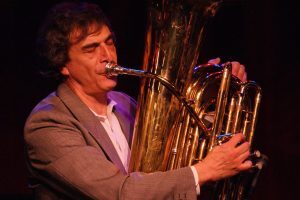
Tuba player David Ostwald got hooked on Louis Armstrong and his music at age 15. “I went to Sam Goody’s (remember record stores?) to buy a new recording of the Bach Double Violin Concerto and spied in the cut-out 99-cents bin a record that had Louis 1930s on one side and Ella 1930s on the other side. I figured I’d grab it. I went home, put on the Louis side, and after “Swing That Music,” had my Louis epiphany. I can divide my life into before and after that experience.”
David has led the Louis Armstrong Eternity Band, which has played every Wednesday evening at Birdland in the heart of New York’s Theater District for the past 20 years (the actual anniversary occurred in May, but due to the Covid-19 shutdown could not be celebrated on or close to the actual date.). “In 2000, the first of Louis Armstrong’s two centennials, my friend George Avakian (more below on how they became friends) convinced Birdland’s owner Gianni Valenti to have my band present a weekly show honoring Louis Armstrong,” said David in a recent phone interview from his home in New York City. “Given that Birdland is the birthplace of bebop—a rebellion against the moldy figs—it’s kind of counter-revolutionary for us to be there, right on their own turf. We are the only banjo/tuba band ever to appear at Birdland in its 70-year history.”
The band puts on a great show, always with top-notch musicianship, punctuated by David’s dry wit on the microphone. Although crowds were slim in the early years, the gig has become a must-see for international tourists as well as fans from around the country and locally, and is often sold out.
Prior to that, David led the predecessor Gully Low Jazz Band; the Eternity band name was conferred by Birdland’s owner and is essentially the next iteration, with the roster of musicians in both little changed other than by the natural aging process. As young players in New York discover traditional jazz, they replace the old-timers who aren’t around anymore. While there has always been a younger and an older generation among jazz musicians, the marked increase in the number of good young players is a very recent (and welcome) phenomenon.
In addition to Birdland, the GLJB/LAEB has appeared regularly in the New York City area at Lincoln Center’s Midsummer’s Night Swing, at the Schomburg Center for Research in Black Culture, at Jazz in July at the 92nd Street Y, at Lionel Hampton’s New Orleans-style funeral procession, and at other venues including the newly revived Cafe Bohemia, as well as internationally at Scotland’s Nairn International Jazz Festival and the Brecon Jazz Festival in Wales.
This is in addition to performances for the Pennsylvania Jazz Society, the Tri-State Jazz Society, Highlights in Jazz, the Hot Jazz Festival, the Duke Ellington Society, the Louis Armstrong House Museum and the Woodbridge Jazz Festival, among many others. The band’s guest musicians have included Wynton Marsalis, Dick Hyman, Jon Hendricks, Clark Terry, Jon Faddis, and blues great Big Joe Turner, whose recording with the band, one of five it has made, was nominated for a Grammy Award in 1986 (Southland SLP-13). The band has also presented numerous educational programs for school children.
David grew up in Swarthmore, Pennsylvania. When he was seven, he started on piano because his older brother was getting lessons. As David relates it, the story of how the tuba came into his life is a bit unusual. “My mother urged me to take up another instrument, like violin or cello, so I could play in an orchestra. When I was 10, she took me to see Prokofiev’s ballet Romeo and Juliet and I was shaken to the core (in a good way) when I heard the tuba in March of the Capulets.
“A few months later, I was at school, running outside for recess and as I passed the open door of the band room I caught a glimpse of the most beautiful golden sousaphone, with a ray of sunlight creating a halo out of its majestic bell. I hit the brakes, ran back into the band room and starting blowing on it. Mr. Holm, the band director, immediately came out of his office and gave me my first lesson on the spot.
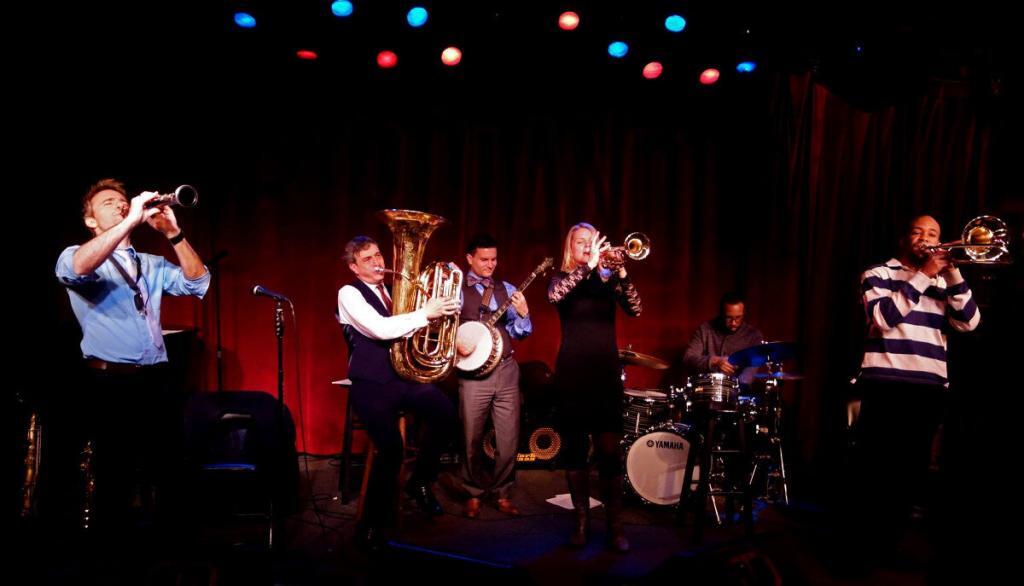
“Two years later, when I turned 13, my parents asked what I wanted for my Bar Mitzvah. I said I wanted my own tuba. They said, ‘No really, what do you want?’ I said I wanted my own tuba. So they said, ‘If you can prove you’re serious about it in the next two years, we’ll get you one when you’re 15.’ I had a friend whose father played in the Philadelphia Orchestra, so I asked him if he could set up up with my hero Abe Torchinsky, its tuba player, figuring if I could just get my toe in the door it would show my parents I was serious.
“My friend came back a week later, saying his dad had spoken with the great Torchinsky, who said he’d listen to me play and would recommend a teacher, but that under no circumstances would he give lessons to a teenage kid. I said that was just fine—I was thrilled merely to have the chance to meet him.
We met one Friday afternoon after the Orchestra’s regular concert at the Academy of Music. I brought my mouthpiece and played his horn (what a thrill!) and we really hit it off. He agreed to give me lessons! I thought I’d died and gone to heaven. So when I was 15, my parents honored the deal and bought me a beautiful tuba of my own, which Mr. Torchinsky got for me wholesale, to the great relief of my father, a moderately-paid college professor.”
As David got more and more into playing orchestral music and brass quintets, he found that the repertoire was somewhat limited for the tuba. “In the orchestra, half the symphonies don’t have tuba parts, but in the ones that do, the tuba counts 5000 measures of silence and then comes in with what of course is the best part of the work. But you don’t get to play much. The chamber music repertoire had some good stuff but was limited. I found myself increasingly playing music by myself written for other instruments, such as Bach cello suites and Mozart horn concertos. This was not satisfying.
“When I was a junior at the University of Chicago, one of my orchestra pals asked if I wanted to play in a jazz band. I said I couldn’t play by ear and didn’t know how to improvise. He said he didn’t either, but we decided to give it a try. He gathered some other novices and we got a book that had the parts written out for each of the six pieces. That band became the Cook County Doo-Dah Boys, which lasted for my last year and a half at college.”
David moved to New York in 1977, following his college graduation, to work for a classical music impresario, but soon realized that he was more driven to play than to manage others’ careers. In fact, the night before his first day of work he showed up at Jimmy Ryan’s with his tuba and asked Max Kaminsky if he could sit in. Max said yes if no one was in the club for the last set at 2:30 AM.
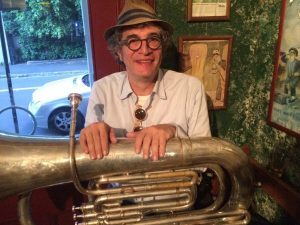
So David had business cards printed up bearing the moniker “The Waltzing Tubador” and went out every night to hear bands, learn tunes, and hustle up some work. Among the most fertile locations was The Red Blazer Too on Manhattan’s Upper East Side, where David met Vince Giordano, whose Nighthawks played every Tuesday night. It was there that Vince and David became lifelong friends. Before too long, David’s band had his first steady gig—at the Red Blazer Too.
David also wanted to have kids, but he needed to find a steadier paycheck than a tuba player could expect. So he went to law school and found work at a firm to work that allowed him to cut out to play gigs whenever the need arose. “My two careers were never really in conflict,” David related, “I never felt like a part-time musician. And I found that success in both fields had a common requirement: being able to listen to the other guy. I believe that my two paths were mutually beneficial.”
David considers himself fortunate to have known and played with many old-timers (some actual primary sources) such as Freddie Moore, Carmen Mastren, Johnny Williams, Joe Muranyi, Benny Waters (who had recorded with King Oliver), and the Casa Loma Orchestra’s Clarence Hutchenrider (a member of the original Vince Giordano’s Nighthawks).
Hutch played with David’s band from 1985 until his death in 1991. “Clarence was such a creative musician, he rarely played the same solo, or ensemble for that matter, even at an advanced age,” David told me, “and he had to re-learn the horn in his later years because of major dental work, and he did so beautifully.” Clarence appears on the Gully Low Jazz Band’s CD Down to Earth (GHB BCD-233).
Waters was 96 years old when he played his final gig, which was with the GLJB in June of 1998 as part of the JVC Jazz Festival. “The first time I heard Benny in person, he was only 93,” David recalled. “I fully expected him to arrive on stage on a stretcher, squeak a few notes, and for the fans to politely comment on how wonderful it was that such an old man could still blow. Yes, he had trouble walking, and he had recently become blind, but boy, was I wrong. I had to comb my hair after the wind from his horn messed up my do. His time, ideas, feel, energy and sound were a teenaged boy’s verve combined with the genius and imagination seventy years of constant experimentation had created. Three years later with my band, he was blowing even stronger, taking four or five choruses and singing chorus after chorus in his deep baritone that sounded like an 18-year old’s. That night Benny Waters put us—all half his age or less—to shame with his marathon performance. What a night!”
 The closest friendship David forged with the older generation was with the legendary record producer George Avakian. As David tells it, “George was always one of my heroes, way before I met him. I had noticed that so many of my favorite (and most influential) jazz records I bought after that fateful day at Sam Goody’s were produced or reissued by George—the four volumes of The Louis Armstrong Story, Louis Armstrong Plays WC Handy, Satch Plays Fats, the three volumes of The Bix Beiderbecke Story and many others.
The closest friendship David forged with the older generation was with the legendary record producer George Avakian. As David tells it, “George was always one of my heroes, way before I met him. I had noticed that so many of my favorite (and most influential) jazz records I bought after that fateful day at Sam Goody’s were produced or reissued by George—the four volumes of The Louis Armstrong Story, Louis Armstrong Plays WC Handy, Satch Plays Fats, the three volumes of The Bix Beiderbecke Story and many others.
“When I was 24 I first met the great clarinetist Joe Muranyi, a member of Louis Armstrong and His All Stars from 1967 until Louis’s alleged death in 1971, who told me that George was a nice approachable guy, that I could call him. But I was intimidated by George’s greatness, and uncharacteristically shy about contacting him. Twelve years later, George tracked me down, having seen my op-ed piece in The New York Times, ‘Louis Armstrong—Civil Rights Pioneer.’ I couldn’t believe it was him calling-–I thought it was Vince playing one of his usual pranks by impersonating George, so I cussed him out.
George was thankfully very understanding, in fact he thought it was funny. Later that night, after my kids were in bed, I called George back. At the end of our five-hour phone conversation, the rising sun marked the beginning of a beautiful friendship that lasted until George’s death 26 years later at age 98.
“We had so much fun together, and what he had to offer in terms of insight and personal history went so far beyond music—for example, he served in the Pacific in WWII and was in Hiroshima the day after the horror. One of the most fun times we had together was when he accompanied me on a jazz cruise as my free add-on companion. When I told Tex Wyndham, the leader of the Rent Party Revellers Band I was playing with on the cruise, that I was bringing George Avakian as my companion, he said, ‘Yeah, and I’m bringing the Pope!’ George enriched my life beyond my ability to ever repay him, but as he pointed out to me whenever I said so, ‘but you can keep trying!’”
Another of David’s friends from that generation is the great writer Dan Morgenstern. As David told me, “Besides being a warm, thinking, brilliant human being, Dan has a unique way of putting into words the experience of being with the musicians and hearing the music that we weren’t around when it was happening. I feel like I’m with Louis when Dan talks about his being with Louis.”
Jack Bradley, the legendary photographer and Louis Armstrong’s great friend is another old-timer David counts among those he is honored to know. One prank Jack played on David made him think Jack had learned it from Louis: the time Jack surreptitiously emptied the tobacco from David’s pipe and replaced it with weed.
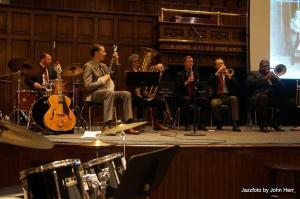
David got an early taste of becoming an old-timer himself at age 29. “One night, I think in 1985, a young kid came up to me during a break at the Red Blazer Too and asked if we played requests. Because of his age, I assumed he wanted to hear a rock-and-roll tune; at that time hardly any people my age (just Vince and Brian Nalepka and a few others) were into the old music. So I said, ‘Sorry, we don’t play rock ‘n roll,’ to which he responded, ‘Actually, sir, I wasn’t requesting rock. I was wondering if you could play San.’ I was shocked. Then he said, ‘Do you know the verse, too?’ Dumbfounded, I said, ‘Who are you?’
“It was 19-year-old Dan Levinson. He was just starting to play the clarinet, and was putting together a band to play the Original Dixieland Jazz Band’s book for a concert at NYU, which he was attending. I told him, ‘Danny, you’re depressing me. I used to be the cute new kid on the block, and now you come along!’ About ten years later, after we had become good friends and played together a lot, he said to me, ‘Osti, do you remember ten years ago when I came to the Red Blazer and you told me how depressed you were at no longer being the fresh new kid? It’s happening to me now. There’s this guy ten years younger than me who’s really into this music, and now I’m no longer the new kid.’ I asked, ‘Who is it?’ ‘Kevin Dorn.’ We started calling him Young Kevin Dorn, a name that has stuck with him to this day, even though he too is on his way to being an old-timer!”
David’s philosophy for the band is to stay away from trying to emulate Armstrong. “A few trumpeters have asked me on their virgin gig with my band if I want them to sound like Louis. I tell them good luck with that one, don’t even try. I just want to capture as much of Louis’s entire spectrum as is within a mere mortal’s capability, from unbridled joy to the most unfathomable despair.”
This distancing is reflected to a certain extent by the LAEB’s instrumentation, which doesn’t match the Hot Five’s, the Hot Seven’s or the All-Stars’, what with the tuba instead of the bass and the banjo or the piano, rather than both as in the Hot Seven. “I’m not wed to the tempos or keys Louis chose when it comes to playing the tunes, we just try and do our version in the swingingest way we know how, and if it resembles his version, so be it, and if it doesn’t, so be it.” When doing gigs outside Birdland, the LAEB is also a highly-respected proponent of the regular hot jazz repertoire of Bix Beiderbecke, Jelly Roll Morton, Duke Ellington, and the other great musicians of the era we all love.
The roster of musicians who’ve done the Birdland gig over the last 20 years exceeds one hundred. Currently, the regular trumpeters are Bria Skonberg, Danny Tobias, or Joe Boga; clarinetists/saxophonists are Adrian Cunningham, Will Anderson, and Ricky Alexander; trombonists are Jim Fryer, Dion Tucker, and Josh Holcomb; and the banjo/guitar and drum chairs are currently held by Arnt Arntzen and Alex Raderman, respectively.
Among the others who have appeared regularly at Birdland over the years are Jon-Erik Kellso, Gordon Au, Ed Polcer, Randy Sandke, Warren Vache, Dan Levinson, Joe Muranyi, Kenny Davern, Anat Cohen, Victor Goines, Ken Peplowski, Bob Wilber, Wycliffe Gordon, Vincent Gardner, John Allred, Dan Barrett, Vince Giordano (on banjo/guitar), Eddy Davis, Matt Munisteri, James Chirillo, Cynthia Sayer, Mark Shane, Ehud Asherie, Eric Reed, Rossano Sportiello, Dick Hyman, Marty Napoleon, Joe Ascione, Herlin Riley, Kevin Dorn, Ali Jackson, Jr., Alvester Garnett, Marion Felder, Rajiv Jayaweera, Dave Gibson and Joe Saylor.
David is also a frequent sideman and has appeared over the years with numerous other bands, including Leon Redbone, Woody Allen, Randy Sandke’s New York All-Stars, the Lincoln Center Jazz Orchestra, Your Father’s Mustache and numerous other local bands.
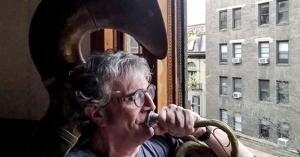 One of David’s favorite sideman gigs was a 20-year stint as a Yankee Doodler, the house band at Yankee Stadium, from 1978 through 1997. “There were two four-piece bands for weekend games and special events (like Bat Day or Old Timers’ Day), and four for post-season games. Each band had a trumpet, clarinet, banjo and tuba. We wore faux-Yankee uniforms and played in the stands, which could be perilous. I had to put a pillow case over my bell to dissuade drunk fans from mistaking my tuba for a basketball hoop, and once my horn was hit by a foul ball.
One of David’s favorite sideman gigs was a 20-year stint as a Yankee Doodler, the house band at Yankee Stadium, from 1978 through 1997. “There were two four-piece bands for weekend games and special events (like Bat Day or Old Timers’ Day), and four for post-season games. Each band had a trumpet, clarinet, banjo and tuba. We wore faux-Yankee uniforms and played in the stands, which could be perilous. I had to put a pillow case over my bell to dissuade drunk fans from mistaking my tuba for a basketball hoop, and once my horn was hit by a foul ball.
The leader of the “A” band was trumpeter Johnny Carisi, a great musican and composer of the modern jazz classic “Israel” which Miles Davis recorded. As a modern player, Johnny was an odd choice for the Yankee Stadium gig. His favorite tune for the stadium was “Things Ain’t What They Used to Be,” which resulted in some quizzical looks from fans who were expecting tunes more along the lines of “Take Me Out to the Ball Game.” But one of the great things about that gig was some of the modern musicians Johnny got on the gig—guys I never would otherwise have played with, such as Jimmy Knepper and Ray Anderson. Plus, playing at three world series over those years was pretty damn fun!”
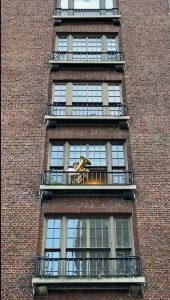 With Birdland closed for now, David is finding old habits die hard. “Every week for the past 20 years, we’ve played ‘Sleepy Time Down South’ three times: at the start and end of the first set, and at the end of the second set. I estimate we’ve played it more than 3,000 times in our 20 years at Birdland, and I never get tired of it. I still have the urge to play it every Wednesday at 5:30 since our last show there March 11th.”
With Birdland closed for now, David is finding old habits die hard. “Every week for the past 20 years, we’ve played ‘Sleepy Time Down South’ three times: at the start and end of the first set, and at the end of the second set. I estimate we’ve played it more than 3,000 times in our 20 years at Birdland, and I never get tired of it. I still have the urge to play it every Wednesday at 5:30 since our last show there March 11th.”
David, who recovered from the Covid-19 virus in April, has filled the void by playing solo out the window of his apartment every evening at seven for the nightly neighborhood tribute to the healthcare workers and first responders. In fact, his picture made page two of the May 8th Wall Street Journal. “I find the best way to get applause for a tuba solo is to play one when everyone is already applauding.”
Visit David Ostwald online at ostwaldjazz.com.
Bill Hoffman is a travel writer, an avid jazz fan and a supporter of musicians keeping traditional jazz alive in performance. He is the concert booker for the Tri-State Jazz Society in greater Philadelphia. Bill lives in Lancaster, PA. He is the author of Going Dutch: A Visitors Guide to the Pennsylvania Dutch Country, Unique and Unusual Places in the Mid-Atlantic Region, and The New York Bicycle Touring Guide. Bill lives in Lancaster, PA.






















